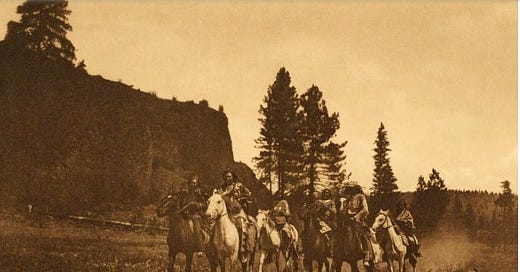‘The world will fall to pieces.’
All the lands of the Spokane and Columbia River basins, covering 4,700 square miles, once belonged to the Spokane, a Native American group of about 2,500 people.
They had lived a semi-nomadic life there for more than nine thousand years.
In the warmer months, the Spokane roamed the region’s grassy lowlands, fished salmon and trout and trapped beaver in its rivers, hunted bighorn sheep and deer in its meadows and hunted bears in its pine forests.
In the winter months, they settled in villages.
The Spokane first encountered Europeans in May 1806 when the Lewis and Clark expedition, traveling east on its journey home, came upon tribal encampments along the Columbia River.
Four years later, more Europeans came.
They built a fur trading post on tribal land and soon, forty white families lived there.
Some Spokane traded with these Europeans, but when they returned to their tribal villages, they brought smallpox, measles and other diseases with them and many Spokane people died.
A large group of white scientists who were exploring coastal areas of the Pacific Basin on behalf of the American government came to the lands of the Spokane in 1841.
When they met the Spokane people, the tribal chief, Cornelius, told the expedition’s commander about a medicine-man’s prophecy which had been made many years before the tribe ever knew about white people.
From the commander’s journal:
“Cornelius, when about ten years of age, was sleeping in a lodge with a great many people, and was suddenly awakened by his mother, who called out to him that the world was falling to pieces.
“He then heard a great noise of thunder overhead, and all the people crying out in great terror.
“Something was falling very thick, which they at first took for snow, but on going out they found it to be dirt.
“It proved to be ashes, which fell to a depth of six inches, and increased their fears, by causing them to suppose that the end of the world was actually at hand.
The commander notes: “Within the last year, the craters on top of Mount Rainier and Mount St. Helen's have been in activity.”
“The medicine-man arose, told them to stop their fear and crying, for the world was not about to fall to pieces.
“‘Soon,’ said he, ‘there will come from the rising sun a different kind of men from any you have yet seen, who will bring with them a book, and will teach you everything, and after that the world will fall to pieces.’”
And so, in time it did, slowly, piece by piece.
First came the Christian missionaries, who arrived in the 1830s and ‘40s.
Then, white settlers came on the Oregon Trail.
The American government gave these white people the right to claim ownership of some of the Spokane land and they set up an American territorial government to make decisions.
Spokane warriors engaged in battle with the American Army in 1858, but they were defeated and lost their horses, villages and winter food supplies.
Then more white settlers and missionaries came.
In 1881, the American government created the Spokane Indian Reservation — just 237 square miles of land — and many Spokane refused to move there.
Dam construction on the Spokane and Columbia rivers ended the salmon runs, depriving the Spokane people of their traditional food.
The railroads came next; and, in 1883, white men discovered gold.
A flood of new white residents came to the region, making a traditional life difficult for Spokane people not living on the reservation.
And in the 1950s, an open pit uranium mine on part of the Spokane reservation contaminated the soil and groundwater.
It’s now a Superfund site awaiting cleanup.
The Spokane medicine man’s prophecy has come true.
But this is the fate which has befallen countless other native peoples across the North American continent.
And the American government is very late in making amends.
******************************
I’ll see you tomorrow.
— Brenda






















Share this post